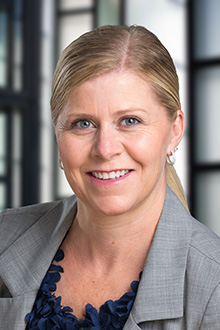Jennifer Oetter Secures Victory in First Civil Jury Trial in Oregon Since the Pandemic Began
Portland, Ore. (November 17, 2020) – Portland Partner Jennifer K. Oetter recently secured a defense verdict in what has been reported as the first civil jury trial to take place in Oregon since the COVID-19 pandemic began. Trying this multimillion dollar medical malpractice action in a high school auditorium over the course of six trial days, Ms. Oetter navigated unique trial logistics to achieve a significant victory on behalf of Lewis Brisbois’ clients.
The Underlying Case
In this case, Lewis Brisbois represented a primary care physician and his employer. The physician had prescribed the diabetes medication, Invokana, for the plaintiff, an 84-year-old man with multiple co-morbidities. At the time that the physician prescribed Invokana, the medication had a boxed warning describing a “twofold” risk of amputation in certain patient populations. However, this warning was later removed because various studies failed to support the conclusion regarding amputation risks. A few months after he stopped taking Invokana, the plaintiff had his first below the knee amputation and nearly eleven months later had his second below the knee amputation.
The plaintiff subsequently filed a lawsuit seeking $4.72 million in Jackson County, Oregon Circuit Court, alleging various negligence claims arising from his physician’s prescription of Invokana.
The plaintiff’s only expert in this case was an endocrinologist who testified that the plaintiff should not have been prescribed Invokana and that the medication caused him to require amputations. The expert testified via live video.
The defense experts included a primary care physician, a vascular surgeon, and a pharmacologist who testified that (1) the plaintiff’s physician met the standard of care in all respects, (2) the amputations were necessitated by the plaintiff’s multiple co-morbidities, and (3) Invokana did not cause the amputations. Two of the three defense experts testified live.
Following the presentation of evidence during trial, the judge granted a directed verdict in favor of the defendants on the failure to obtain informed consent claim, reasoning that the plaintiff failed to offer any evidence that he would not have taken Invokana had he been properly warned. The judge then sent the remaining negligence claims to the jury. After only 20 minutes of deliberation, the jury returned a defense verdict on each of the remaining claims.
Pandemic-Related Logistics
To allow for sufficient social distancing, the trial was held in the auditorium of a high school in Medford, Oregon. The judge, judicial assistants, and witnesses sat at separate tables on the stage. Counsel tables were set up below the stage, and the jury sat throughout the auditorium. Every table had a bottle of hand sanitizer, and the court staff cleaned the witness chairs and equipment each time they were touched by something. Court staff, attorneys and their staff, and witnesses wore masks except when talking. The jurors were required to wear masks the entire time. The jury deliberation room had tables for each juror, and they were spaced six feet apart.
Witnesses were not required to appear in person, but if they did, they sat in a witness box with a plexiglass partition. Ms. Oetter, accompanied only by the plaintiff’s physician and a media specialist, appeared in person each day along with her client. There was a plexiglass divider between them. The rest of Lewis Brisbois’ litigation team and the claim professional watched the trial on Zoom from its Portland office. With permission from the court and opposing counsel, the media specialist was able to set up a Zoom call on a separate computer that lasted all day.
Against the backdrop of challenges that included unique trial logistics and a sympathetic elderly plaintiff who testified that he yearned to play golf once again, Ms. Oetter persuasively presented Lewis Brisbois’ clients’ case. She succeeded in helping the members of the jury to understand complex medical testimony such that they ultimately returned a defense verdict.
In recounting her experience, Ms. Oetter shared that the trial “was a lot of work for the court and their staff and they handled everything really well.” Similarly, she emphasized the exceptional dedication of her colleagues who worked from Lewis Brisbois’ Portland office to support her during trial, noting that they “worked incredibly hard and never flinched at any bump in the road. This was a new experience for all of us and they were really creative and amazing in getting things done.” Moreover, Ms. Oetter explained that she learned that the Oregon Chief Justice was communicating with the Jackson County presiding circuit court judge throughout the trial to determine how the logistics were working.
Ms. Oetter is a partner in Lewis Brisbois’ Portland office and a vice-chair of its Healthcare, Medical Malpractice, and Long-Term Care & Elder Law Practices. She focuses her practice on civil litigation and the representation of hospitals and health care professionals.
